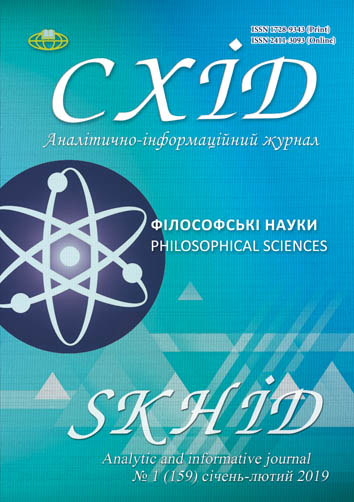Consolidating role of historical memory in formation the moral foundations of modern Ukrainian society
DOI:
https://doi.org/10.21847/1728-9343.2019.1(159).157593Keywords:
historical memory, man, modern Ukrainian society, moral principles, consolidationAbstract
The article is devoted to the analysis of the consolidating role of historical memory in forming the moral principles of modern Ukrainian society. The significance of historical memory in the development of the collective consciousness of the Ukrainian nation, the translation of all spiritual experience - knowledge of higher moral values: goodness, truth, beauty, love for freedom and justice - to the next generations is highlighted. Man and people in general are considered as the main bearers, actors and creators of historical memory. It is analyzed that the best ethical examples are created in national history as certain ways of comprehension of national interests. They are firmly fixed in historical memory and go to the historical arena in a dialectical progression - in a new form, taking into account the modern conditions of life, new pragmatic knowledge, technologies and ideas that each new generation produces.Downloads
References
Andrushchenko, V. P. (2006). Organizational Suspension: The Problem of Organizing and Sustaining Self-Organization in the Period of Radical Transformations in Ukraine on the Border of the Table. Еxperience of socio-philosophical analysis. Kiev: Atlant YUEMSi, 502 p. (in Ukrainian)
Astafiev, Y. G. (1992). Postmodernism in the cognition of society. Political studies. 3, 63-71. (in Russian)
Barash, J. (2011). On the imagination and the place of collective memory in the public sphere. Socium: Philosophical Sciences. 2, 83-96. (in Ukrainian)
Blumenberg, H. (1985). The Legitimacy of the Modern Age. Cambridge, The MIT Press, 728 p. (in English)
Bogdanov, A. A. (1989). Tectology: (Universal organizational science). Moscow: Economics, 304 p. (in Russian)
Baudrillard, J. (2000). Symbolic exchange and death. Moscow: Dobrosvet, 387 p. (in Russian)
Gorsky, V. (2006). Near sources: essays on the history of philosophical culture of Ukraine. Kyiv: Publishing House "Kyiv-Mohyla Academy", 257 p. (in Ukrainian)
Hrushevsky, M. (1991). Who are Ukrainians and what they want. Kyiv: Znannia of Ukraine, 240 p. (in Ukrainian)
Drahomanov, M. (1991). Selected ... My intention is to sketch an outline of the history of civilization in Ukraine. Kyiv: Lybid, 686 p. (in Ukrainian)
Yermolenko, A. M. (1999). Communicative Practical Philosophy. Kyiv: Libra, 488 p. (in Ukrainian)
Zdravomyslov, A. (1986). Requirements. Interests Values. Moscow: Politizdat, 233 p. (in Russian)
Kasyanov, G. (2007). The state-building process in Ukraine, 1991-2006. Political experience of independent Ukraine. Kyiv: Naukova dumka, 2007, 160-223 (in Ukrainian).
Kosellek, R. (2002). The Practice of Conceptual History: Timing History, Spasing Concepts (Cultural Memory in the Present). Stanford: Stanford University Press, 363 p. (in English)
Kokanovsky, V. (1999). Philosophy and methodology of science. Rostov n/D: Phoenix, 575 p. (in Russian)
Mikhalchenko, M. I. (2004). Ukraine as a new historical reality: European back-up player. Drohobych: VF «Vidrodzhennya», 488 p. (in Ukrainian).
Megill, A. (2007). Historical epistemology. Moscow: Kanon+, 480 p. (in Russian)
Nora, P., & Ozuf, M., & Puimierz, J. de, & Vinok, M. (1999). Problematic of places of memory. In: France - memory. St.Petersburg: Publishing house of S.-Petersburg, 17-50. Retrieved from http://ec-dejavu.ru/m-2/Memory-Nora.html (in Russian)
Parsons, T. (1993). The Concept of Society: Components and Their Relationships. Editorial journal "Sociology". 3-4, 137-171. (in Russian)
Popovіch, M. (2006). Theory of Mentality. Problems of the theory of mentality. Kyiv: Naukova dumka, 3-30. (in Ukrainian)
Ricker, P. (1995). Around politics. Kyiv: "DL", 334 p. (in Ukrainian)
Rozumnyy, M. (2016). Challenges of national self-determination. Kyiv: NISS, 196 p. Retrieved from http://www.niss.gov.ua/content/articles/files/Rozumniy_druk-915a0.pdf (in Ukrainian)
Ryabchuk, M. (2012). From "chaos" to "stability": a chronicle of authoritarian consolidation. Kyiv: NISS, 288 p. Retrieved from https://bookland.com/download/1/10/107312/sample.pdf (in Ukrainian)
Sorokin, P. A. (1992). Man. Civilization. Society. Moscow: Politizdat, 543 p. (in Russian)
Spencer, G. (1906). Social statistics: Expression of social laws that determine the happiness of mankind. St.Petersburg: Publishing house Vrublevsky, 534 pp. (in Russian)
Stepiko, M. (2011). Ukrainian Identity: The Phenomenon and Principles of Formation. Kyiv: National Institute for Strategic Studies, 336 p. Retrieved from http://www.niss.gov.ua/content/articles/files/Ident-62307.pdf (in Ukrainian)
Pazenok, V. S. (Ed.) (1999). Society at the dawn of the XXI century: a philosophical understanding of the flowing world. Kyiv: Ukrainian Center for Spiritual Culture, 268 p. (in Ukrainian)
Downloads
Published
How to Cite
Issue
Section
License
Copyright (c) 2019 Liudmyla Ovsiankina

This work is licensed under a Creative Commons Attribution-NonCommercial-NoDerivatives 4.0 International License.
1. Authors bear responsibility for the accuracy of facts, quotations, numbers and names used.
2. Manuscripts are not sent back.
3. The publisher does not always agree with the authors' opinion.
4. The authors reserve the right to authorship of the work and pass the first publication right of this work to the journal under the terms of a Creative Commons Attribution-NonCommercial-NoDerivatives 4.0 International License. This license allows others to distribute (copy) the published work for non-commercial purposes, provided there is mandatory attribution to its authors and a link to the first publication in our journal.
5. The authors have the right to conclude separate supplement agreements that relate to non-exclusive work distribution in the form in which it has been published by the journal (for example, to upload the work to the online storage of the journal or publish it as part of a monograph), provided that the reference to the first publication of the work in this journal is included.

